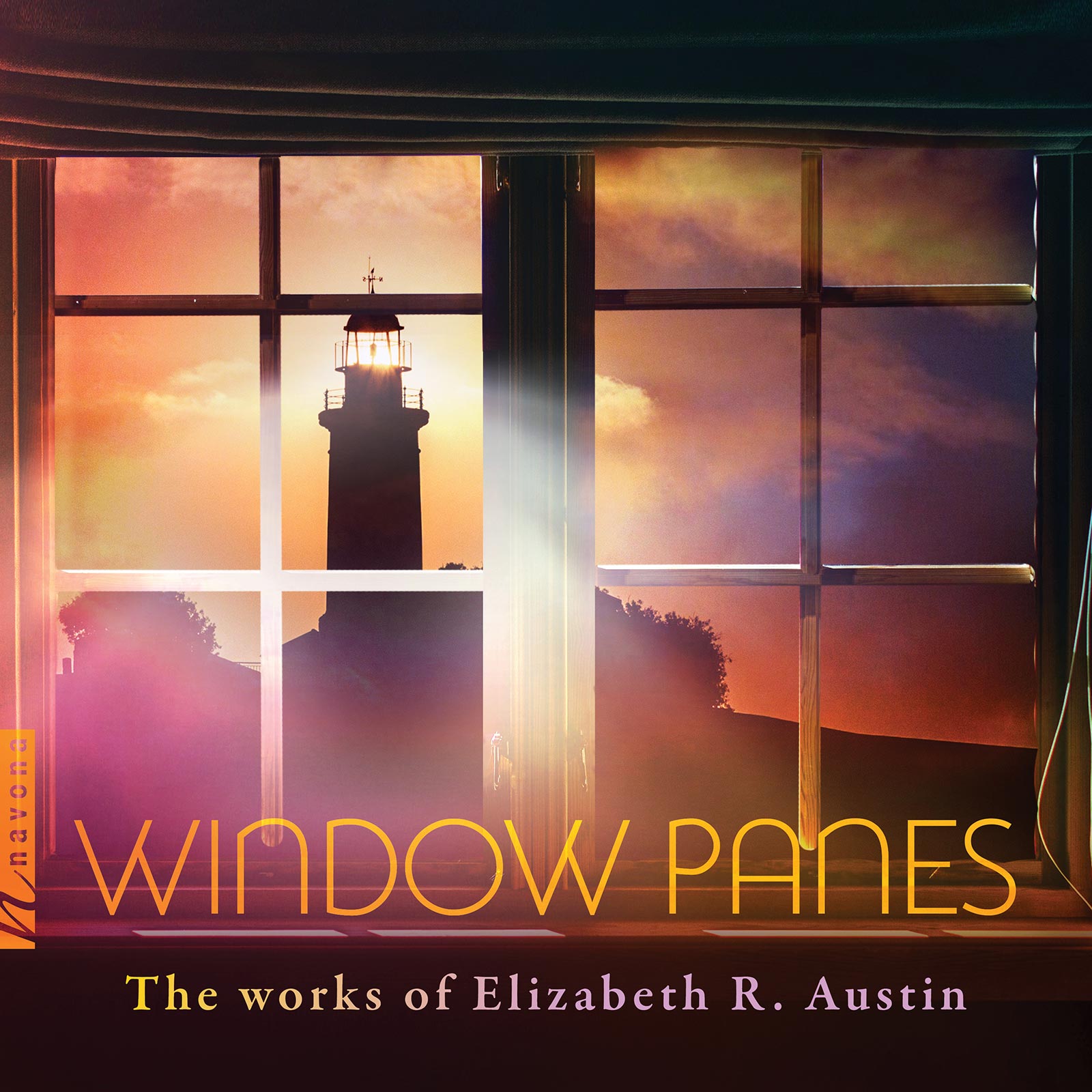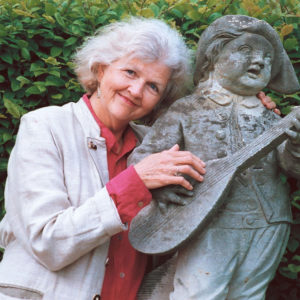
Share Album:
Window Panes
Elizabeth R. Austin composer
Navona presents WINDOW PANES, a cross section of works by compositional veteran Elizabeth R. Austin. The collection is the first to comprise a lifetime of the American's works into one album: and as the title insinuates, it is an album full of interwoven associations, subconscious reminiscences and intense melodic reflections, with decades of labor condensed into an hour of listening.
But WINDOW PANES isn't just an album; it's a musical biography. In 1959, Austin won a scholarship after Nadia Boulanger had heard her Three Rilke Lieder, featured here (the piano accompaniment played by Austin herself). But there are more recent works, too, such as her Symphony No. 1, Wilderness, originally recorded in Poland in 1991, and Symphony No. 2, Lighthouse, recorded in the Czech Republic in 2005. Strikingly, despite the decades between these works, the quality of the individual pieces has remained constant. In spite of their vast differences in complexity in terms of instrumentation of formal structure, one impressively finds the early exactly on par with the later symphonies.
Occasionally, times and places have influenced the pieces, such as An American Triptych, which incorporates elements of jazz and blues into a distinctly contemporary blend. For the Five Sonnets from the Portuguese, the traditional lyrics aren't an obstacle to the modern zeitgeist: indeed, they are so timeless that they would neither be out of place at a modernist concert in 1910's Vienna, nor a contemporary music recital in America today.
But perhaps the work hinting closest at Austin's own, personal nature is Puzzle Preludes. Ironically, its subtitles suggest it to be a set of preludes based on classical composers, but quite mischievously defies this expectation. It is here that Austin's own voice is heard most clearly.
WINDOW PANES is the distillate of a life dedicated to contemporary serious music: filled with complexity, diversity, and great dedication.
Listen
Stream/Buy
Choose your platform
"Austin's musical language is quite densely effective in both its use of harmony and instrumentation"
Track Listing & Credits
| # | Title | Composer | Performer | |
|---|---|---|---|---|
| 01 | Symphony No. 1 "Wilderness" | Elizabeth R. Austin | Kraków Radio & Symphony Orchestra | Szymon Kawalla, conductor; Melinda Liebermann, Anthony King - reciters | 19:03 |
| 02 | Symphony No. 2 "Lighthouse": I. Lighthouse - Water Tower Mannheim - Watch Hill | Elizabeth R. Austin | The Moravian Philharmonic Orchestra | Joel Eric Suben, conductor | 12:30 |
| 03 | Symphony No. 2 "Lighthouse": II. Burlesque on a Theme by Johann Stamitz | Elizabeth R. Austin | The Moravian Philharmonic Orchestra | Joel Eric Suben, conductor | 5:45 |
| 04 | Symphony No. 2 "Lighthouse": III. Elegia | Elizabeth R. Austin | The Moravian Philharmonic Orchestra | Joel Eric Suben, conductor | 4:54 |
| 05 | An American Triptych: No. 1, Rag Quodlibet | Elizabeth R. Austin | Ulrich Urban, piano | 2:08 |
| 06 | An American Triptych: No. 2, The Bellagio Blues | Elizabeth R. Austin | Ulrich Urban, piano | 3:54 |
| 07 | An American Triptych: No. 3, Hoedown | Elizabeth R. Austin | Ulrich Urban, piano | 2:39 |
| 08 | Sonnets from the Portuguese: No. 1, The Face of All the World | Elizabeth R. Austin | Melinda Liebermann, soprano; Cornelius Witthöft, piano | 3:04 |
| 09 | Sonnets from the Portuguese: No. 2, Say Over Again | Elizabeth R. Austin | Melinda Liebermann, soprano; Cornelius Witthöft, piano | 2:13 |
| 10 | Sonnets from the Portuguese: No. 3, Unlike Are We | Elizabeth R. Austin | Melinda Liebermann, soprano; Cornelius Witthöft, piano | 3:00 |
| 11 | Sonnets from the Portuguese: No. 4, First Time He Kissed Me | Elizabeth R. Austin | Melinda Liebermann, soprano; Cornelius Witthöft, piano | 1:50 |
| 12 | Sonnets from the Portuguese: No. 5, How Do I Love Thee? | Elizabeth R. Austin | Melinda Liebermann, soprano; Cornelius Witthöft, piano | 2:39 |
| 13 | Puzzle Preludes (Excerpts): No. 1, Brahms | Elizabeth R. Austin | Ulrich Urban, piano | 2:05 |
| 14 | Puzzle Preludes (Excerpts): No. 2, Bach | Elizabeth R. Austin | Ulrich Urban, piano | 1:47 |
| 15 | Puzzle Preludes (Excerpts): No. 3, Chopin | Elizabeth R. Austin | Ulrich Urban, piano | 1:35 |
| 16 | Puzzle Preludes (Excerpts): No. 5, Beethoven | Elizabeth R. Austin | Ulrich Urban, piano | 1:41 |
| 17 | Puzzle Preludes (Excerpts): No. 6, Mendelssohn | Elizabeth R. Austin | Ulrich Urban, piano | 1:52 |
| 18 | 3 Rilke Lieder: No. 1, Autumn Day | Elizabeth R. Austin | Amanda Kohl, soprano; Christopher Grundy, baritone; Elizabeth R. Austin, piano | 2:33 |
| 19 | 3 Rilke Lieder: No. 2, Autumn | Elizabeth R. Austin | Amanda Kohl, soprano; Christopher Grundy, baritone; Elizabeth R. Austin, piano | 2:03 |
| 20 | 3 Rilke Lieder: No. 3, Lovesong (Arr. for Voice Duet) | Elizabeth R. Austin | Amanda Kohl, soprano; Christopher Grundy, baritone; Elizabeth R. Austin, piano | 2:36 |
WILDERNESS” SYMPHONY (NO.1)
Text from the poem Wilderness by Carl Sandburg
SONNETS FROM THE PORTUGUESE
Text by Elizabeth Barrett Browning
THREE RILKE LIEDER
Text by Rainer Maria Rilke
translation Elizabeth R. Austin
Elizabeth R. Austin's music is published by the AMERICAN COMPOSERS ALLIANCE (composers.com).
TRACK 1
Recorded June, 1991 in the Concert Hall of Kraków in Kraków, Poland
Session Producer Jerzy Norowol
Session Engineer Malgorzata Polanska Szostakowska
Session Editor Lech Polwinski
TRACK 2-4
Recorded May 24, 2005 in the Concert Hall of Olomouc in Olomouc, Czech Republic
Session Engineer Frantisek Poul
TRACK 5-7
Recorded privately in 2004, in Leipzig, Germany
Session Engineer Albrecht Urban
TRACK 8-12
Recorded 1992 at the Staatliche Musikhochschule in Heidelberg/Mannheim, Germany
Session Engineer Manuel Veronesi
TRACK 13-16
Recorded live October 19, 2019 at the Paliesiaus Manor in Mielagenu, Lithuania
Session Engineer Andrius Vasiliauskas
TRACK 17-19
Recorded November 12, 2019 at Hartt School of Music Recording Studio, the University of Hartford in West Hartford CT
Session Engineer Shane Carroll
Executive Producer Bob Lord
Executive A&R Sam Renshaw
A&R Director Brandon MacNeil
A&R Jacob Smith
VP, Audio Production Jeff LeRoy
Audio Director Lucas Paquette
Mastering Shaun Michaud
VP, Design & Marketing Brett Picknell
Art Director Ryan Harrison
Design Edward A. Fleming
Publicity Patrick Niland, Sara Warner
Artist Information

Elizabeth R. Austin
Elizabeth R. Austin's music is meticulous and complex, filled with movement, growth, and turning points. Not a bad description for her own life.” This quote, from an article in SCOPE (Winter, 2011) written by Michael K. Slayton, continues to be relevant to this octogenarian, whose focus on writing music has become even more intense!
Notes
“WINDOWPANING”
Most of the music on this album uses a stylistic trait, inspired by imagining the mind’s eye peering through an aural window pane (or porthole) to a musical landscape, a “remembrance of things past,” Michael K. Slayton describes this technique in my music in Chapter One of his book Women of Influence in Contemporary Music: Nine American Composers, Scarecrow Press, 2011: pp.19-23.
Slayton quotes me: “What engages me is to so imbed tonal quotes from music of the past in my own pantonal fabric, that what has sounded familiar becomes transformed into something foreign and fleetingly invasive. An associative web of aural memories, threads of musical nostalgia, appear with startling recognition before departing with ease. It is as though my own music is caught off balance by an ‘invader’, wrapped in familiar disguise. Lo and behold, my contemporary harmonic fabric begins to sound ‘right’ to the listener, while the audacious tonal quote seems oddly out of place.”
The first example of ‘windowpaning’ appears in “Wilderness” Symphony (No. 1), which sets Sandburg’s poem “Wilderness”, a psychological habitat of our subconscious bestiary. The ‘heartbeat’ motive suggests a similar life force to that of Stravinsky’s Petroushka, whose will to live bursts the bonds of the spirit. Steven Metcalf (The Hartford Courant, 1988) writes: “with deft, sparkling orchestrations...and quotes from American folk tunes, “Wilderness” Symphony showed both craft and spirit.”
“Lighthouse” Symphony (No. 2) also contains many quotes, all related through pitch. Peter Burwasser writes (Fanfare, 2008, Vol. 31, No. 6): ”Elizabeth R. Austin’s... three-movement symphony manages the remarkable feat of being strikingly original at the same time that it is jam-packed with musical quotations.... The immediate inspiration of the music is the sea (Debussy’s La Mer is quoted early on), which she conjures with explosive crescendos and glistening tonality. It is fun to try to identify the quotes, but more important is the cohesion and power of the music as a whole.” Cross currents between the various quotations interact with the ‘lighthouse’ motive, with some passages, such as Wolf’s Mondnacht (Moonlit Night) even providing optical allusions.
An American Triptych offers the Bach family’s party amusement with musical quotations called a ‘quodlibet’. Their musical high spirits produced a rowdy juxtaposition of familiar tunes in patchwork style. The ‘Hoedown’ compresses snippets of American folk tunes in a rough and tumble “blaze of fun” (Patella, “New Music Connoisseur”, Vol 7).
Sonnets from the Portuguese contain self-quotes in cyclical fashion, with much of the thematic material recurring in varying guises.
Each of the Puzzle Preludes (selected) center around a musical quote, cited either verbatim or intentionally ‘bent’. “Her piano style is a quite original one, which, apparently effortlessly, cites past works and develops them.” (Thomas Schlage, Mannheimer Morgen, 1998).” Again Michael Slayton (pp.20-23): Puzzle Preludes, “the zenith illustration of the windowpane method, offers quotations as musical puzzles for the player (and capable audience members) ... the listener is invited to guess the source of each quote ... As passages from the past arise fully intact or as a mere caress of something familiar, the listener is left pondering, ‘Did I just hear what I think I heard?’... Austin’s music seeks to do more than simply conjoin the past with the existing world; it means to intertwine them, to make them coexist, to evolve them into something entirely new...This is the imperative for Austin - the artist as a vessel, ‘through which the stuff of the cosmos is allowed to flow’.” Lastly, Fred Patella views this “playful set featuring quotes and impressions of famous piano music” as “the first hint of the loving tribute Austin’s music exudes, not only to composers from the past, but to music in general.”
The vocal music on this album does not contain any quotes. The poem texts in a song must be front and center! Our opera, I am one and double too, however, is a musical retrospective of a lifetime of composing; it is full of windowpaning, even involving taking selfies!
— Elizabeth R. Austin
